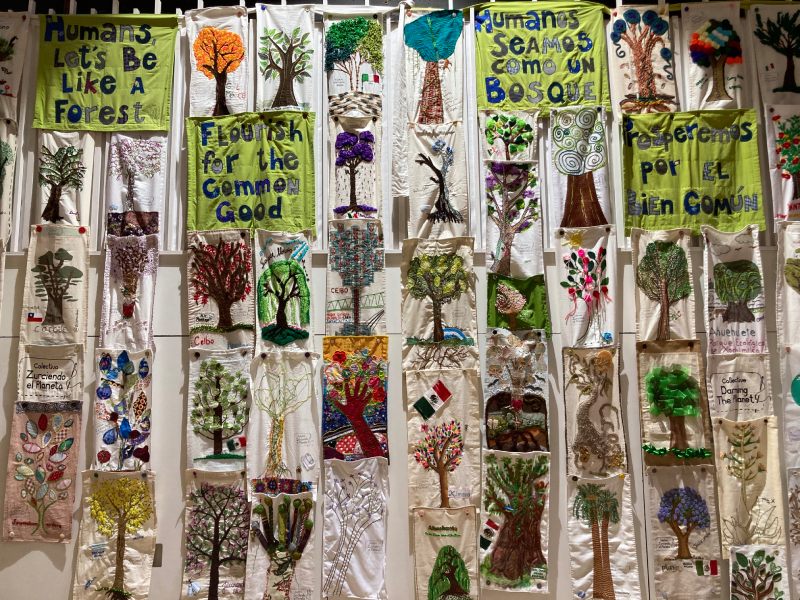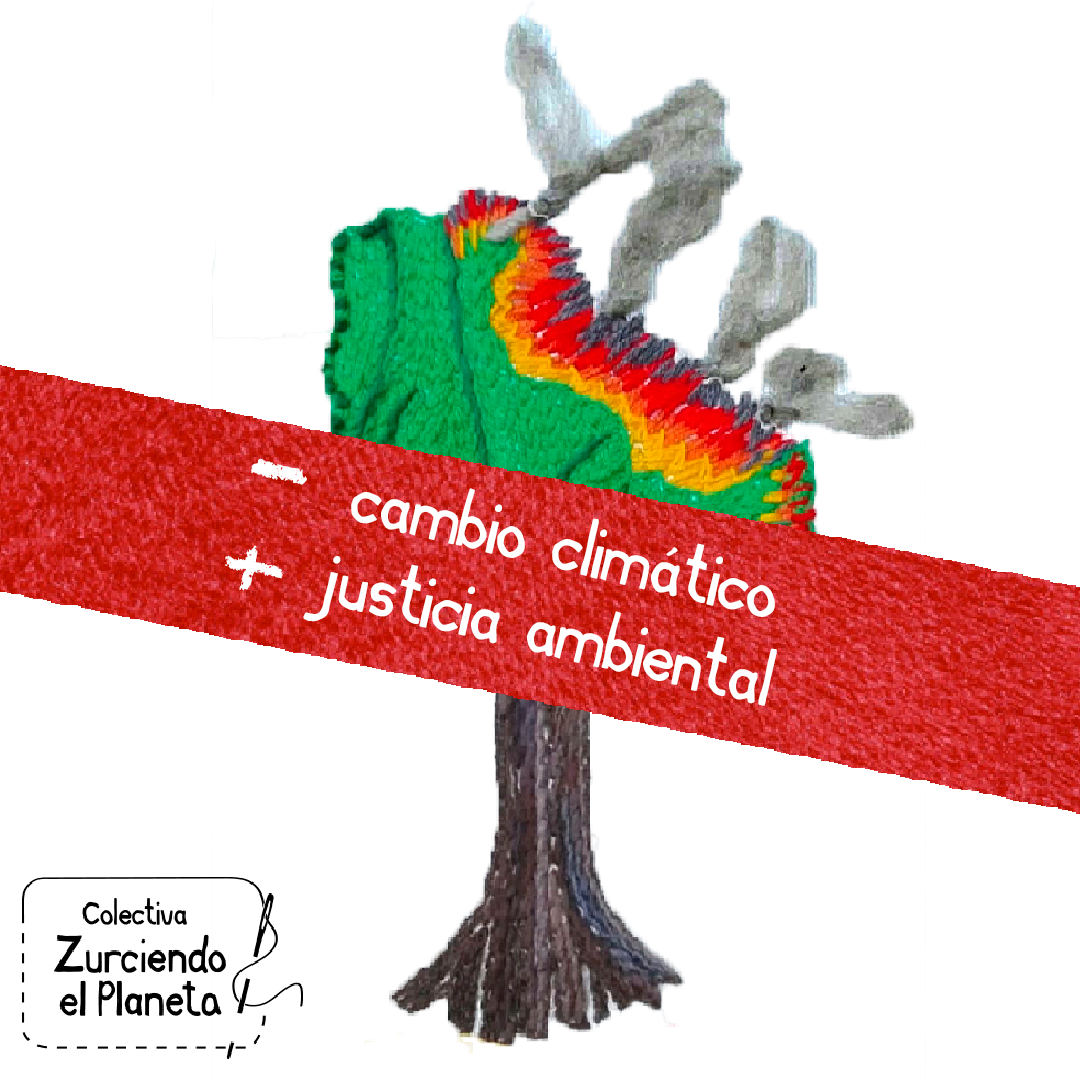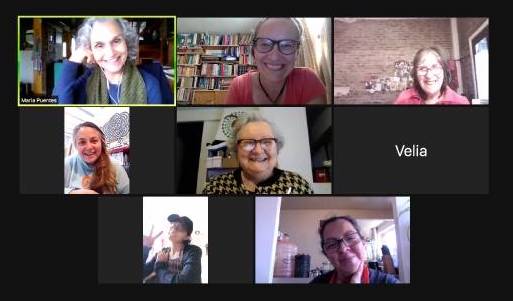Lee este artículo en español

This forest that travelled to COP26 in Glasgow is an act of hope, of stubborn optimism. Being optimistic doesn’t mean hiding from the hard facts, it means confronting them with the real possibilities that we still have to stop causing damage and to repair damage done, and find the strength to work with determination for these actions to become reality.
In particular we want to contribute to moving our societies to the point where taking the actions necessary to make our communities (urban and rural) truly regenerative feels collectively like something inevitable, instead of «being regenerative» being a marginal idea that only «crazy environmentalists» campaign for. We will all have to be environmentalists in the generations ahead, otherwise no-one will have much fun.

Lets talk about climate change with stubborn optimism. On 9th August 2021 the IPCC published its latest report on all the climate science available to the present. The intergovernmental panel on climate change confirms
- within the uncertainties of all scientific studies, the increase in temperature that has been measured over recent decades is due to human activities (human activities meaning the way in which we consume natural resources and how we turn almost everything into rubbish). The scientific evidence associating these temperature rises to climate alterations (flooding, drought, extreme heat, fires, hurricanes) is stronger compared to previous reports.
- these magnitudes of temperature change in such a short time are unprecedented in thousands of years
- we will probably hit 1.5 degrees of warming by about 2034
Under current and projected conditions, the extreme weather events will continue and get worse with every 0.1 degree of temperature increase.

WHERE is the optimism??
The report includes models of regional impact. They say, with a high degree of confidence in their models, that if we manage to lower our green house gas emissions IMMEDIATELY (and apply measures of mitigation like reforestation among others) in very few years we stand a VERY GOOD chance of substantial improvements in GHG concentrations, surface temperature reduction and air quality improvement.
You can read the report here
Things are not going well on this planet. But that doesn’t mean it’s not worth acting. It means we URGENTLY need to take action. Don’t assume someone else is dealing with it because it’s not looking good.
¡we have to take action!

Psychological fact
We usually learn to respond in a certain way to certain adverse events. Faced with climate change, most of us have learnt to respond with a sense of powerlessness because of the enormity and complexity of the problem, so we look away when more bad news slides onto our screens and we carry on our lives as before.
But that’s the wrong response. And at this point it’s IRRESPONSIBLE! Although a few individuals and organizations have taken a stand, as a global society we have allowed decades to pass without mobilising to demand different leaders, without seeking new forms of governance that enable us to better define priorities within our societies, without finding ways for the population to have greater strength to remove leaders who are not working for the common good.
So we have to train ourselves not to feel powerless; for each item of bad news to strengthen our resolve to seek out change. Let’s look at it differently: we can imagine that we are lucky to be living at the key moment in history. If humanity survives our own destructive disaster, in the future this will be remembered as a turning point in history. Make sure you’re part of the movement for an equitable and regenerative future.

¿How to keep your stubborn optimism going?
Faced with most peoples «normal» reaction to bad climate news, we usually feel powerless. But we are not powerless. Each action we take has a deeper meaning, it’s part of the most important movement in the history of humanity. If we manage to stop and reverse most of the environmental damage we’ve caused: it will be the greatest thing our species has ever done.
Take a step back and look at your sense of powerlessness and transform it consciously into recognition that you are part of an enormous international movement. If you can’t believe it, join our installation. Embroider a tree! We, the stitchers of trees to create an international forest of hope, we leave our zoom sessions with that feeling of hope. There are far more of us than we believed.
Read about the project

We share principles and a great longing. We encourage each other and it makes us all able to be stronger in our communities to leave a regnerative footprint in all the different places that we live in.
Even if at home your the «crazy», every reference to climate change in your groups of friends and family, begins, little by little to make an impact. You are really creating fertile ground for the day they run into someone they admire who says the same thing … and your friend/family member will be able to reply «Oh yes, my friend/sister/mother/daughter is also making compost/separating rubbish/harvesting rainwater/defending the environment». It might take time but it will come. We must take heart, those of us who already know, and dare to speak it more and more loudly (but without shouting, shouting has its place, but not at the dinner table, and it’s unlikely to convince your friends).
Humanity learns from the collective. We have to make our enlightened collectivities bigger so that they are more influential.

You can read more about the idea of stubborn optimism in The Future we Choose by Christiana Figueres and Tom Rivett-Carnac. Ask your local library to stock it if they don’t already have it or buy it from an independent bookshop. Avoid buying from Amazon because it’s a company that does NOT promote social or environmental wellbeing for anyone.
The paragraphs in this article were originally published in Spanish as instagram posts in September/October 2021. The photographs for the English translation may be different to the original instagram images.
